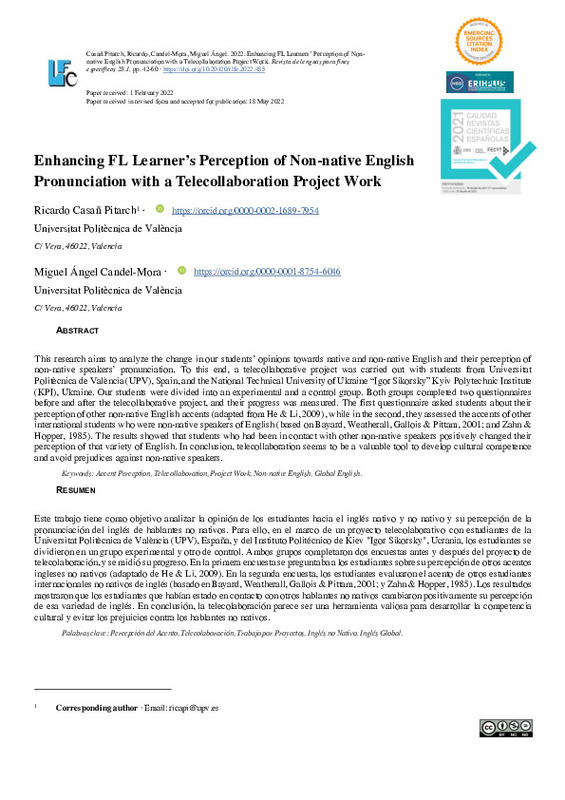JavaScript is disabled for your browser. Some features of this site may not work without it.
Buscar en RiuNet
Listar
Mi cuenta
Estadísticas
Ayuda RiuNet
Admin. UPV
Enhancing FL Learners' Perception of Non-native English Pronunciation with a Telecollaborative Project Work
Mostrar el registro completo del ítem
Casañ-Pitarch, R.; Candel-Mora, MÁ. (2022). Enhancing FL Learners' Perception of Non-native English Pronunciation with a Telecollaborative Project Work. LFE. Revista de Lenguas para Fines Específicos. 28(1):42-60. http://hdl.handle.net/10251/198249
Por favor, use este identificador para citar o enlazar este ítem: http://hdl.handle.net/10251/198249
Ficheros en el ítem
Metadatos del ítem
| Título: | Enhancing FL Learners' Perception of Non-native English Pronunciation with a Telecollaborative Project Work | |
| Autor: | ||
| Entidad UPV: |
|
|
| Fecha difusión: |
|
|
| Resumen: |
[ES] Este trabajo tiene como objetivo analizar la opinión de los estudiantes hacia el inglés nativo y no nativo y su percepción de la
pronunciación del inglés de hablantes no nativos. Para ello, en el marco de un proyecto ...[+]
[EN] This research aims to analyze the change of our students' opinion towards native and non-native English and their perception of non-native speakers¿ pronunciation. To this purpose, telecollaborative project work was ...[+]
|
|
| Palabras clave: |
|
|
| Derechos de uso: | Reconocimiento - No comercial - Sin obra derivada (by-nc-nd) | |
| Fuente: |
|
|
| Editorial: |
|
|
| Versión del editor: | https://ojsspdc.ulpgc.es/ojs/index.php/LFE/article/view/1479 | |
| Código del Proyecto: |
|
|
| Agradecimientos: |
This work is one of the results of the educational innovation and improvement project PIME / 20-21/202 "Teaching global English as a Lingua Franca among non-native speakers in virtual learning environments as a factor of ...[+]
|
|
| Tipo: |
|







